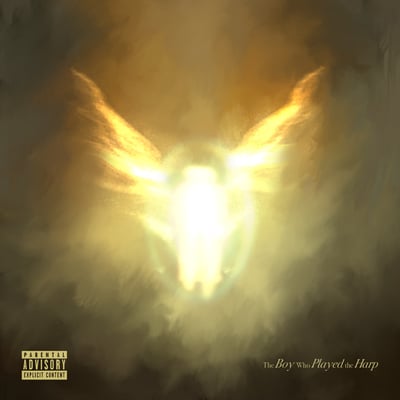
Dave The Boy Who Played The Harp
Dave's The Boy Who Played The Harp arrives as a muted, finely wrought collection of moral reckonings and intergenerational counsel, and critics largely agree it succeeds. Earning an 85/100 consensus score across 5 professional reviews, the record foregrounds spare production and intimate storytelling, with several reviewers identifying Chapter 16 (feat. Kano), Fairchild, Raindance (feat. Tems) and collaborative cuts like No Weapons (feat. Jim Legxacy) and History (feat. James Blake) among the best songs on the album.
Critics' Top Tracks
The standout songs that made critics take notice
Chapter 16 (feat. Kano)
5 mentions
"The brilliant Chapter 16 is styled as a lengthy dialogue"— The Guardian
Fairchild
4 mentions
"It’s harrowing, gripping and powerful"— The Guardian
Selfish (feat. James Blake)
4 mentions
"You should have had kids … don’t you feel like you’re behind?"— The Guardian
The brilliant Chapter 16 is styled as a lengthy dialogue
Track Ratings
How critics rated each track, relative to this album (0-100). Only tracks that made critics feel something are rated.
History (feat. James Blake)
175 Months
No Weapons (feat. Jim Legxacy)
Chapter 16 (feat. Kano)
Raindance (feat. Tems)
Selfish (feat. James Blake)
My 27th Birthday
Marvellous
Fairchild
The Boy Who Played the Harp
What Critics Are Saying
Deep insights from 6 critics who reviewed this album

Critic's Take
In measured, melancholic prose Lawrence Burney finds the best tracks on The Boy Who Played The Harp in moments of rueful counsel and intimate confession. He lingers especially on Chapter 16 (feat. Kano), praising its six-minute, convincingly genuine conversation and Kano’s probing questions that crystallize the album’s stakes. That same reflective tone colours other highlights, framing Dave as an artist negotiating fame, faith, and solitude across the record. If you’re searching for the best songs on The Boy Who Played The Harp, Burney points readers toward the intergenerational honesty and James Blake-accented melancholy that make tracks like Chapter 16 (feat. Kano) stand out.
Key Points
-
The best song is Chapter 16 because its intergenerational dialogue and Kano’s questions crystallize the album’s emotional stakes.
-
The album’s core strengths are its melancholic mood, intimate reflections on fame and faith, and moments of genuine conversational lyricism.
Themes

Critic's Take
In a measured, cinematic review voice, Dave's The Boy Who Played The Harp is praised most for intimate, vignette-like tracks such as Selfish, Chapter 16 and Fairchild, which the reviewer frames as the album's emotional center. The critic admires how Selfish turns "therapy into theatre" and how Chapter 16 functions as a spiritual handover between generations, while Fairchild is noted for its chilling spoken-word exchange. Though applauded as technically flawless and lyrically impeccable, the tone warns that the record sometimes prefers solemn reflection over immediate, anthemic payoff. Overall, the best songs on the album are positioned as those intimate scenes that reveal Dave's strengths: detailed storytelling, moral questioning, and generational dialogue.
Key Points
-
The best song is Selfish because it fuses confessional lyricism with James Blake's haunting production to turn therapy into theatre.
-
The album's core strengths are vivid, cinematic storytelling and moral, generational questioning, even if the solemn tone limits immediate anthemic moments.
mu

Critic's Take
In The Boy Who Played The Harp Dave finds his sweetest moments in company, and the best tracks - Chapter 16, No Weapons and Raindance - show why. The record balances introspection and outward-looking confidence, and you can hear that in the pleading confession of 175 Months and the celebratory doubt of My 27th Birthday. There is a crowning, cinematic grace to Chapter 16 that makes it the album’s centerpiece, while James Blake and Jim Legxacy elevate the collaborative cuts. Overall it feels like a step from prodigy to master storyteller, with collaborations sharpening rather than diluting his voice.
Key Points
-
The best song is Chapter 16 because the reviewer calls it the album’s crowning moment and a cinematic conversation with Kano.
-
The album’s core strengths are Dave’s storytelling, strong collaborations, and an emotional blend of faith and introspection.
Themes

Critic's Take
As Alexis Petridis observes, Dave's third album The Boy Who Played The Harp is a muted, quietly brilliant record where the best songs - notably Chapter 16 and Fairchild - reveal his storytelling and moral urgency. The review stresses that rather than swagger, tracks like Marvellous and Selfish dig into late-20s existential doubt, making them among the best tracks on the album. Petridis writes in his characteristically measured, observational tone, underlining how sparse arrangements focus attention on Dave's voice and exemplary flow. This is an album whose best songs feel fascinating rather than self-indulgent, and that restraint is its triumph.
Key Points
-
Fairchild is the best song for its harrowing, gripping, and powerful storytelling.
-
The album's core strength is its muted, sparse production that foregrounds Dave's voice and sharp lyricism.
Themes

Critic's Take
In a voice that never settles for easy answers, Dave makes clear across The Boy Who Played The Harp that his best songs arrive where confession meets craft: opener History frames the record’s themes with church organ gravitas, while the shockingly moving Fairchild and the intimate reckonings of 175 Months stand out as the best songs on the album. The collaborations - from James Blake’s shaping of History to Tems’ beauty on Raindance - sharpen his arguments, and the title track closes with a multi-faceted performance that cements this as one of his boldest statements yet. This is a record of short, impeccably detailed essays - the best tracks are those that pair personal vulnerability with expansive social thinking.
Key Points
-
The best song is emotionally potent because it pairs personal confession with empathetic, widescreen storytelling, as heard on "Fairchild".
-
The album’s core strengths are its spiritual concerns, concise detailed storytelling, and high-calibre collaborations that amplify Dave’s themes.